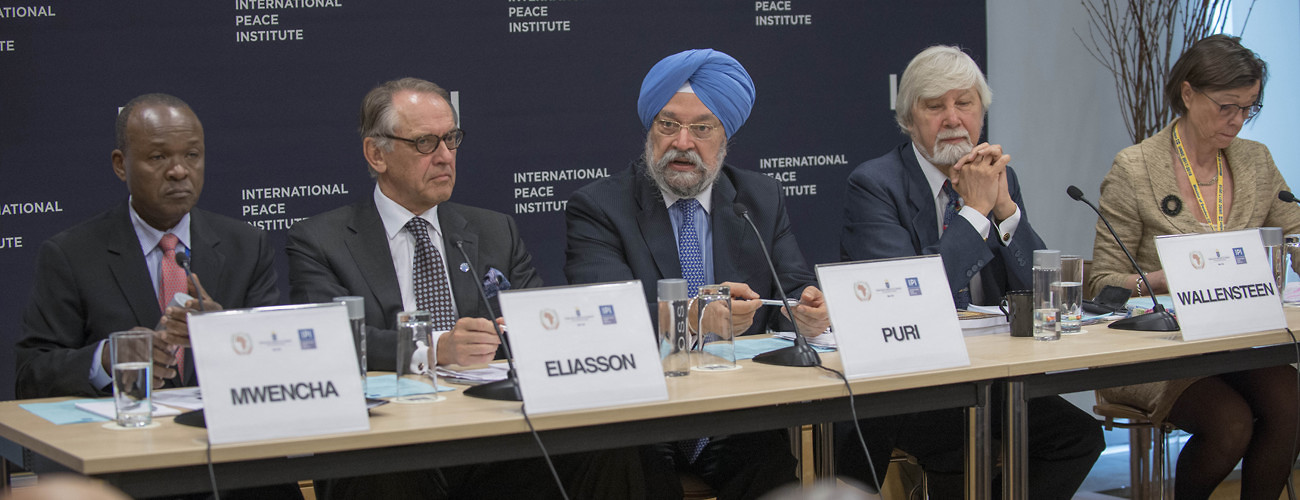A group of high-level international diplomats and government representatives said the proliferation of conflicts in Africa points to the need for the United Nations (UN) to rethink the way it works with the African Union (AU) in promoting peace and security on the continent.
This emerged from a May 4th policy forum on the topic of “Advancing Chapter VIII: The AU-UN experience” co-hosted by IPI, the African Union Commission, and the Permanent Mission of Sweden to the UN. During the event, top AU and UN officials said that when it comes to solving Africa’s conflicts, Chapter VIII of the UN Charter should serve as the main point of reference. However, they also lamented that its text has largely been neglected over the years.
Chapter VIII of the UN Charter states that UN members should “make every effort to achieve pacific settlement of local disputes through such regional arrangements or by such regional agencies before referring them to the Security Council.” Over the years, the provision has been interpreted as urging the UN to support such regional arrangements in order to help maintain the peace.
“The very simple conclusion is that we cannot do it alone,” said UN Deputy Secretary-General Jan Eliasson. “There is no organization, whether it’s the United Nations, regional organizations, or a government, that can handle today’s problems alone. In today’s globalized, complex world,” he continued, “we have to find solutions together.”
Mr. Eliasson said some of the conflict-mediation tools used so far are no longer relevant because the changing nature of conflict and the rise of new military actors have changed the calculus when it comes to war and peace. Organizations like the UN and the AU, he said, should adjust to this switch and realize that effective conflict resolution can only come through cooperation.
The first step to take would be for the UN to change the mindset with which it operates, he said, going from a vertical to a horizontal approach to regional organizations. “This means [we have to] look at the competences we have, identify the problems, put the problem at the center, and then ask ourselves who can do something about it,” he said, adding that this would ideally lead to an effective division of labor between the UN and other organizations.
The deputy chairperson of the African Union Commission, Erastus Mwencha, agreed with Mr. Eliasson on the need for better communication between the UN and regional bodies such as the AU. “Let’s be candid and agree that we are sometimes part of the problem and therefore should be part of the solution,” he said. Africa currently hosts the vast majority of UN peacekeeping missions, he said, and at the various meetings and summits the discussions are always the same, covering the same issues.
“There is a danger that we are either working in silos [or] prescribing the same things,” he said. “We should ask ourselves: Can we be more innovative? Can we be active on the ground? Can we see action?”
Better cooperation in maintaining peace and security is all the more timely, the panelists said, given recent global developments. According to Peter Wallensteen, professor of Peace and Conflict Research at Uppsala University in Sweden, 2014 was one of the deadliest years in recent history in terms of battle-related casualties.
“We calculated that last year about 100,000 people died in political battles involving the use of weapons for political purposes,” he said. “Half of those deaths are recorded in Syria.”
The most striking factor behind these conflicts, Mr. Wallensteen said, is how internationalized they have become. “They are not just fought in a territory of one country,” he noted. “[There’s] a lot of international involvement, not only by far away countries but by neighbors”—which indicates that regions are also failing to ensure the peace.
For its part, the AU has been actively involved in conflict management and resolution on the continent, the panelists said. Annika Söder, Sweden’s vice-minister for Foreign Affairs, praised the work carried out by the AU over the past 15 years, noting that the situation now is very different from what it was back then. That said, she also stressed that there are some aspects of the AU-UN relationship that could be reassessed, first among them the issue of inclusivity, especially when it comes to peacebuilding efforts.
“If you do not involve ordinary people, if we do not see to it that there’s an ownership of the processes that we engage in,” she said, “they will obviously not last.”
Watch event:








